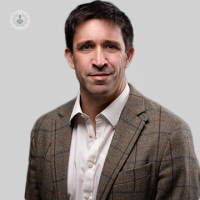Pharyngeal pouch surgery
Written by:A pharyngeal pouch at the top of the oesophagus can cause food to stick in your throat, regurgitation, aspiration, and in extreme cases can even make it impossible to eat. Treating this condition usually involves surgery. Expert ENT surgeon Mr Stuart Winter is here to explain how this is done.

Endoscopic stapling/laser
These minimally invasive measures involve passing a rigid endoscope (a thin tube with a camera at the end) through the patient’s mouth and into the upper oesophagus to find the pouch. The camera is used to inspect the lining of the oesophagus.
Some endoscopes are equipped with a laser, which is used to divide the wall of the pharyngeal pouch, while others staple the pouch closed using the adjacent tissue so that food no longer becomes caught as it passes down the gullet. The sphincter (ring of muscle) at the top of the oesophagus is cut to reduce the chance of reoccurrence.
Post-operative care
Patients are usually allowed to drink fluid on the same day as the operation, but have to build back up to eating solid food. They will spend the night in hospital after the operation so that they can be monitored. They are usually sent home the following day.
Complications
Complications of endoscopic stapling and laser procedures are rare. Occasionally, patients experience damage to the teeth caused by the endoscope when it was in their mouth. In other cases, a hole can occur in the stapled pouch, which allows food and drink to leak into the neck. However, this should heal if allowed to rest, and a feeding tube may be used in the meantime.
Another potential problem is that in the long term the pharyngeal pouch can reform, meaning that further treatment may be needed in the future.
Open repair
As well as the minimally invasive methods, there is also the option of open surgery to repair a pharyngeal pouch. The patient will be given a general anaesthetic to render them unconscious and the surgeon makes an incision on the left side of the neck through which they can repair the pouch.
Learn more about pharyngeal pouches here!
If you wish to book an appointment with a surgeon with expertise in pharyngeal pouch surgery, visit Mr Winter’s Top Doctors profile.


